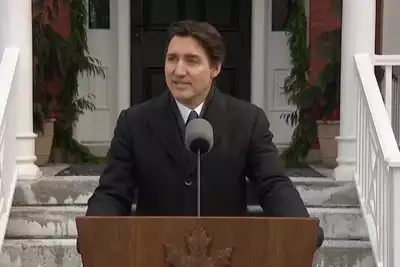Justin Trudeau has announced his resignation as Prime Minister of Canada and leader of the Liberal Party, effective immediately. His decision, confirmed on Monday, marks the end of an era in Canadian politics. While the exact timeline for his departure from office remains unclear, Trudeau is expected to remain as Prime Minister until a new leader is selected, though the transition could happen swiftly.
Trudeau’s resignation comes at a moment of heightened tension between Canada and India, a relationship that has been under strain following his allegations regarding the killing of Khalistani activist Hardeep Singh Nijjar on Canadian soil. Trudeau accused the Indian government of orchestrating the killing, a claim that New Delhi has consistently denied. With no substantial evidence presented by Trudeau’s team, the accusation left a cloud of distrust hanging over bilateral ties. Now, as Trudeau steps down, the future of Canada-India relations hangs in the balance.
The impact on policy and diplomacy
Trudeau’s departure could signal a shift in Canada’s foreign policy, particularly with regard to India. The question on many minds is whether the Liberal Party will elect a new leader who continues Trudeau’s critical stance or whether a new government will seek a fresh diplomatic approach.
If the Liberals manage to retain power, the next leader will likely face the challenge of maintaining a delicate balance between economic interests and political tensions with India. The focus may remain on the contentious issues surrounding the killing of Nijjar and the strained diplomatic ties that followed.
However, with the Conservative Party now likely to gain traction, Canada’s foreign policy could take a different turn. Conservative leader Pierre Poilievre, who has been vocal about his critical stance on Trudeau’s handling of relations with India, may seek to prioritize trade and economic collaboration, potentially de-escalating tensions. Yet, Poilievre’s record, including his controversial decision to withdraw from a Diwali event in 2022, has raised concerns among some of Canada’s Indian diaspora. His approach could be a double-edged sword—seeking pragmatic solutions while navigating sensitive cultural and political issues.
Trade and economic relations: A new chapter?
Under Trudeau’s leadership, Canada-India trade flourished, reaching $8.4 billion by the end of the 2024 fiscal year. Key exports from Canada, including minerals, potash, and industrial chemicals, flowed to India, while Canada received pharmaceuticals, electronic equipment, and precious stones from India. These mutually beneficial economic ties were bolstered by ongoing trade talks, including the Comprehensive Economic Partnership Agreement (CEPA), which remains a significant area of focus.
With Trudeau’s resignation, the question now is how the new leadership will handle trade relations. A potential shift in policy could disrupt ongoing trade negotiations, with India closely monitoring any changes that might affect their commercial interests. Whether Canada retains the current trajectory or pivots to a more conservative approach could shape the future of bilateral economic cooperation.
Immigration and the Indian diaspora: A critical crossroad
One of the most significant legacies of Trudeau’s tenure has been his handling of immigration. His government’s decision to end the fast-track study visa program, SDS, has been a point of contention, particularly among Indian students. With 427,000 Indian students currently studying in Canada, this decision has had far-reaching effects. Trudeau’s cuts to international student permits—reducing the number by 35% this year and by an additional 10% next year—have sparked frustration, particularly within the Indian community.
As the Conservative Party looks set to take a more prominent role in Canadian politics, Poilievre’s views on immigration could further impact Canada-India relations. Poilievre has been outspoken about returning to a more selective immigration system, one that favors “highly promising” students and workers. His criticism of Trudeau’s policies has already earned him support from some sections of the Canadian public, but it has also garnered criticism from Indian groups who feel alienated by his stance.
What lies ahead?
Trudeau’s resignation marks a dramatic turning point for Canada’s political landscape. While the country faces a time of transition, the implications of his departure on Canada-India relations are far-reaching. With India’s growing geopolitical importance and economic potential, the next Prime Minister will need to carefully navigate the complex dynamics of trade, immigration, and diplomacy.
As the Liberal Party moves toward selecting a new leader, all eyes will be on the future of Canada-India relations, which could enter a new phase, either healing the wounds of the past or further exacerbating tensions. The coming months will be crucial in determining how the leadership transition plays out and what it means for Canada’s position on the global stage, particularly in its dealings with India.




